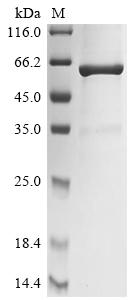Recombinant Chicken Lysozyme C (LYZ) , Biotinylated
CAT:
399-CSB-EP013283CH-B-02
Size:
100 µg
Price:
Ask
- Availability: 24/48H Stock Items & 2 to 6 Weeks non Stock Items.
- Dry Ice Shipment: No




Recombinant Chicken Lysozyme C (LYZ) , Biotinylated
- CAS Number: 9000-83-3
- Gene Name: LYZ
- UniProt: P00698
- Expression Region: 19-147aa
- Organism: Gallus gallus
- Target Sequence: KVFGRCELAAAMKRHGLDNYRGYSLGNWVCAAKFESNFNTQATNRNTDGSTDYGILQINSRWWCNDGRTPGSRNLCNIPCSALLSSDITASVNCAKKIVSDGNGMNAWVAWRNRCKGTDVQAWIRGCRL
- Tag: N-terminal MBP-tagged and C-terminal 6xHis-Avi-tagged
- Source: E.coli
- Field of Research: Cardiovascular
- Assay Type: Developed Protein
- Relevance: Lysozymes have primarily a bacteriolytic function; those in tissues and body fluids are associated with the monocyte-macrophage system and enhance the activity of immunoagents. Has bacteriolytic activity against M.luteus.
- Purity: Greater than 85% as determined by SDS-PAGE.
- Activity: Not Test
- Length: Full Length of Mature Protein
- Form: Liquid or Lyophilized powder
- Buffer: If the delivery form is liquid, the default storage buffer is Tris/PBS-based buffer, 5%-50% glycerol. If the delivery form is lyophilized powder, the buffer before lyophilization is Tris/PBS-based buffer, 6% Trehalose, pH 8.0.
- Reconstitution: We recommend that this vial be briefly centrifuged prior to opening to bring the contents to the bottom. Please reconstitute protein in deionized sterile water to a concentration of 0.1-1.0 mg/mL.We recommend to add 5-50% of glycerol (final concentration) and aliquot for long-term storage at -20℃/-80℃. Our default final concentration of glycerol is 50%. Customers could use it as reference.
- Molecular Weight: 62.1 kDa
- References & Citations: "Molecular characterization of goose- and chicken-type lysozymes in emu (Dromaius novaehollandiae): evidence for extremely low lysozyme levels in emu egg white." Maehashi K., Matano M., Irisawa T., Uchino M., Kashiwagi Y., Watanabe T. Gene 492:244-249 (2012)
- Storage Conditions: The shelf life is related to many factors, storage state, buffer ingredients, storage temperature and the stability of the protein itself. Generally, the shelf life of liquid form is 6 months at -20℃/-80℃. The shelf life of lyophilized form is 12 months at -20℃/-80℃.
